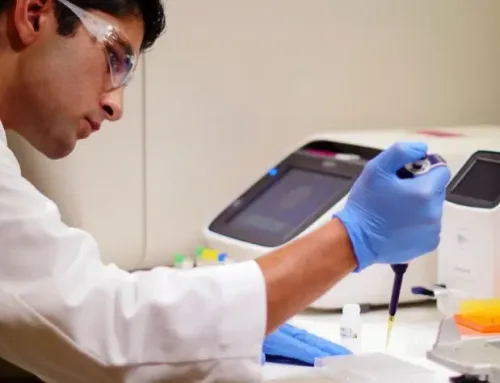Top Genetic Counseling Schools in the United States

The top genetic counseling schools in the United States are training a new generation of healthcare professionals to guide patients through some of today’s most complex medical decisions. As fields like personalized medicine, genomics, and hereditary risk assessment grow, the need for highly trained genetic counselors continues to rise—across hospitals, research centers, and biotech companies alike.
If you’re drawn to science, communication, and patient care, genetic counseling offers a path where all three come together. The right program will support you with the academic foundation, hands-on training, and clinical experience you need to move forward with purpose.
How to Choose the Right Genetic Counseling Program
Choosing a genetic counseling program is a big step. You’re building a foundation for a career that blends advanced science, patient communication, and ethical decision-making. That foundation starts with finding a program that gives you real preparation: in the classroom, in clinical settings, and in the conversations you’ll have with patients throughout your career.
As you explore your options, there are a few core areas to focus on. From accreditation to clinical training, the right mix of structure and support will help you stay focused, grow your skill set, and move toward certification with confidence.
What Makes a Strong Genetic Counseling Program?
- ACGC Accreditation
Make sure the program is accredited by the Accreditation Council for Genetic Counseling (ACGC), which ensures academic and clinical standards are fully met. - Fieldwork and Clinical Rotations
Look for programs that build in diverse clinical experiences across hospitals, research centers, and specialty clinics. - Curriculum Design
A balance of molecular genetics, counseling theory, communication skills, and psychosocial training is key. - Online vs. In-Person Formats
Decide whether full-time, on-campus learning or a hybrid model fits your schedule and learning style. - Board Exam Prep
Top programs integrate support for the ABGC certification exam into the curriculum. - Career Placement Support
Access to resume workshops, mock interviews, and alumni networks can make a real difference in your job search.
Why Clinical Experience Matters
The best way to learn how to support patients is by working with them directly. Fieldwork gives you exposure to a range of real-world situations: prenatal counseling, oncology, pediatric genetics, and more. These rotations help you build confidence, refine your communication style, and better understand how families process complex information and make critical decisions.
Ethics, Equity, and the Evolving Role of Counselors
Ethical decision-making is part of the everyday work of genetic counselors. Today’s programs are incorporating bioethics, social determinants of health, and health equity directly into the curriculum. Understanding how to serve diverse communities with empathy, cultural awareness, and clinical accuracy is a non-negotiable skill.
A program that includes conversations around access, representation, and advocacy helps you stay aligned with the direction healthcare is heading—more collaborative, more equitable, and more connected to the needs of individuals and families.
Research, Capstone Projects, and Professional Development
Academic depth matters just as much as hands-on training. Many genetic counseling programs include a capstone, thesis, or research requirement that helps you explore a specific area of interest while developing critical thinking and presentation skills. These projects also give you a chance to contribute to the field in a meaningful way, whether you’re focusing on clinical innovation, public health, or patient education.
Top 7 Genetic Counseling Schools in the United States
Genetic counseling is one of the fastest-growing careers in healthcare. As genomic medicine moves from the lab to the front lines of patient care, the need for professionals trained to interpret and explain genetic information is more important than ever. The strongest genetic counseling programs prepare students not only with scientific knowledge, but with the communication skills, ethics training, and clinical experience needed to support patients through life-changing conversations.
1. Southern California University of Health Sciences (SCUHS) – Flexible, Future-Focused, and Nationally Recognized
Genetic counselors are playing a leading role in personalized, precision medicine. They help individuals and families understand their genetic information, assess health risks, and navigate the medical and emotional aspects of inherited conditions. The MS in Genetic Counseling at SCUHS is built for students who want that impact—without needing to relocate or leave other responsibilities behind.
Our hybrid format combines 100% online synchronous coursework with immersive, in-person clinical fieldwork across the country. Students gain real-world experience in patient care, diagnostics, advocacy, and lab-based genetics, all while building foundational knowledge in genomics, counseling, and health equity.
Our program at a Glance:
- Full-time, 5-term program
- Live online classes + in-person fieldwork at sites nationwide
- Curriculum includes genomics, counseling, ethics, and public health
- Board exam prep integrated into required coursework
- Accredited by the Accreditation Council for Genetic Counseling (ACGC)
- Graduates eligible to sit for the ABGC certification exam
- Fixed tuition guarantee, federal aid eligibility, and scholarship opportunities
- Guaranteed interview for qualified graduates of SCU’s Pre-Genetic Counseling certificate
What sets us apart:
- Flexible Format – Log in to live courses from anywhere, while completing diverse fieldwork experiences in your local region or beyond.
- Built-in Board Prep – Board exam preparation is embedded into your curriculum from day one—no extra study packages needed.
- Equity-Focused Training – Courses center not only on science, but also on counseling ethics, psychosocial care, and reducing health disparities.
If you’re ready to build a meaningful future in genetic counseling, request more information or apply today.
2. Northwestern University (Chicago, IL)
Northwestern’s Genetic Counseling Program is one of the oldest and most established in the country. Located within a top-tier academic medical center, the program offers access to a wide variety of clinical rotations, cutting-edge research, and interdisciplinary collaboration. With a small cohort size, students benefit from close mentorship and strong support through board exam prep and job placement.
3. Johns Hopkins University / NHGRI (Baltimore, MD + Bethesda, MD)
This joint program between Johns Hopkins University and the National Human Genome Research Institute (NHGRI) combines academic excellence with direct federal research exposure. Students engage in advanced coursework, policy analysis, and research, with access to NIH labs and clinicians. It’s well suited for those interested in academic careers, public health, or health policy.
4. Stanford University (Stanford, CA)
Stanford’s program offers students access to one of the most tech-forward medical ecosystems in the world. With small class sizes and heavy integration into genomics research and innovation, this program emphasizes precision medicine, counseling techniques, and ethical decision-making. Clinical rotations and capstone research are embedded across the curriculum.
5. University of Michigan (Ann Arbor, MI)
The University of Michigan offers a well-balanced program that blends advanced genetics education with intensive psychosocial training. Its large network of clinical and research placements supports hands-on learning and post-graduation opportunities. Students benefit from a strong alumni network, a comprehensive curriculum, and a high match rate for placements.
6. Emory University (Atlanta, GA)
Emory’s program is known for its focus on health equity and outreach. Students participate in diverse clinical rotations, global health projects, and communication training designed to prepare them for a wide range of genetic counseling roles. Capstone work often centers on rare disease awareness, underserved populations, and culturally sensitive care.
7. University of Minnesota (Minneapolis, MN)
With a strong public health focus and consistently high board pass rates, the University of Minnesota’s program is a leading choice for students in the Midwest. The curriculum includes genetics, ethics, research methods, and counseling, with options to pursue policy or community-based work. Fieldwork experiences are wide-ranging, and in-state tuition provides added value for local students.
What You’ll Study in a Top Genetic Counseling Program
Genetic counseling brings together science, communication, and empathy, so your training needs to reflect that blend. In a strong master’s-level program, you’ll build a foundation in genomics and diagnostics while developing the clinical and counseling skills required to support patients through deeply personal and sometimes emotional decisions.
The curriculum is carefully structured to prepare you for real-world situations, certification exams, and the responsibilities of guiding individuals and families through genetic information. Here’s what that journey looks like:
Core Areas of Study
- Genetics and Genomics
You’ll explore human genetics, molecular biology, and inheritance patterns—building fluency in how genes affect health, development, and disease. - Genetic Testing and Diagnostics
Courses cover testing technologies, result interpretation, and lab workflows to prepare you for evaluating and explaining test outcomes. - Psychosocial Counseling
You’ll learn strategies for delivering sensitive information, managing emotional responses, and building trust with patients and families. - Risk Assessment and Communication
You’ll practice how to assess hereditary risks, explain probabilities, and guide decision-making based on both data and values. - Ethics and Law in Genomics
Legal considerations, patient privacy, and emerging bioethical issues are central to navigating the social impact of genetic information. - Health Equity and Cultural Competence
Programs emphasize inclusive care and awareness of systemic barriers in healthcare, helping you work across communities.
Practicum, Research, and Professional Readiness
Your academic coursework is supported by hands-on clinical rotations, known as practicums. These placements take you into hospitals, labs, and specialty clinics, where you’ll observe and contribute to real genetic counseling sessions. These experiences are essential for building clinical confidence and applying what you’ve learned in class.
Many programs also require a capstone or research project that allows you to explore an area of personal or professional interest. These projects develop your research, communication, and analytical skills, while contributing to the field in meaningful ways. Board preparation is often integrated into the curriculum, so you’re progressing toward certification from day one.
At SCUHS, we offer a comprehensive and interdisciplinary curriculum that reflects all of these elements—plus a flexible hybrid format designed to meet you where you are. If you’re curious about how our program brings these topics together, explore our MS in Genetic Counseling here.
Fieldwork, Practicums & Clinical Placements: A Non-Negotiable
Fieldwork is where everything comes together. It’s where theory meets practice, and where future genetic counselors begin shaping the skills, judgment, and communication style they’ll carry into their careers. Every strong program includes a structured, supportive approach to practicum experiences, and these experiences matter as much as the coursework itself.
Fieldwork helps you understand the real impact of genetic counseling. You’ll observe sessions, engage in patient conversations, contribute to diagnostics, and build the interpersonal awareness needed to guide people through deeply personal decisions.
Types of Fieldwork Experiences to Look For
- Patient Counseling Rotations – Work alongside practicing genetic counselors in prenatal, cancer, pediatric, and general genetics settings.
- Laboratory-Based Diagnostics – Gain insight into test processing, variant interpretation, and reporting within a clinical lab environment.
- Public Health, Policy, or Advocacy – Contribute to community-based programs or organizations shaping the future of genetic care.
- Telehealth or Remote Counseling – Build digital communication skills increasingly vital in today’s healthcare landscape.
Top genetic counseling programs invest in building strong placement networks. They help match students with high-quality sites and ensure supervision and mentorship throughout the process. Placement variety is essential, it gives you exposure to multiple specialties, populations, and settings, helping you become more adaptable and well-rounded.
If you’re comparing programs, it helps to ask specific questions about placement structure, site diversity, and faculty involvement. The quality of your fieldwork experience can shape both your confidence and your career path. Choose a program that treats this part of your training with the weight it deserves.
Start Your Path to Becoming a Genetic Counselor
The demand for skilled, compassionate genetic counselors continues to grow—driven by advances in genomics, increased patient access to testing, and a broader understanding of how genetics shapes lifelong health. Top genetic counseling schools are responding with programs that emphasize scientific depth, clinical practice, and ethical care.
If you’re ready to pursue a graduate program that prepares you for certification, impact, and long-term growth in the field, now is the time to take the next step. Explore your options, ask the right questions, and choose a program that reflects your goals and values. Request more information or start your application today.
FAQs
How long does it take to complete a genetic counseling master’s program?
Most accredited programs are designed to be completed in about two years of full-time study. This typically includes five to six academic terms, fieldwork placements, a capstone or research project, and preparation for the American Board of Genetic Counseling (ABGC) certification exam. Some programs offer part-time or hybrid formats, but two years is the common timeline for students preparing to enter the workforce immediately after graduation.
What types of jobs can I get as a genetic counselor?
Genetic counselors work in a wide range of environments—hospitals, cancer centers, fertility clinics, pediatric settings, research labs, biotech companies, public health agencies, and more. Some specialize in prenatal care, oncology, or neurogenetics, while others focus on lab roles or industry positions related to test development or policy. The field is expanding quickly, with many new opportunities in telehealth and personalized medicine.
Do I need a specific undergraduate major to apply to a genetic counseling program?
No single major is required, but strong preparation in biology, genetics, psychology, and statistics is essential. Many applicants come from science backgrounds, but others transition from public health, nursing, or social sciences. What matters most is that you’ve completed the prerequisite coursework and have relevant experience, such as shadowing genetic counselors, volunteering, or working in healthcare or research environments.
What should I look for when comparing the top genetic counseling schools?
Look closely at accreditation, board exam pass rates, clinical placement networks, curriculum structure, and faculty expertise. The top genetic counseling schools offer interdisciplinary coursework, diverse fieldwork, and strong career support. If you’re planning to apply, ask about flexibility, cohort size, and how the program prepares you for certification and real-world practice. Visiting info sessions or talking with current students can also give valuable insight into fit and culture.
Is SCUHS’s genetic counseling program fully online?
The coursework in our MS in Genetic Counseling is delivered 100% online in a live, synchronous format, so you’ll interact with faculty and peers in real time, no matter where you live. Fieldwork takes place in person, and we work with you to secure placements in your region. This hybrid model gives you flexibility with structure and support built in from day one.
How does SCUHS support students with fieldwork placements?
We offer a personalized placement process. Our team collaborates with each student to coordinate meaningful fieldwork experiences in their local area or in specialized clinical settings that match their goals. You’ll gain exposure to core specialties like prenatal, cancer, and pediatric counseling, as well as lab-based and advocacy settings—equipping you with broad, real-world experience before you graduate.
Related Posts




